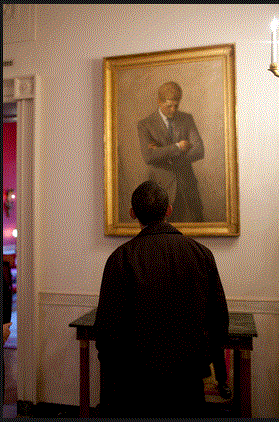
Today we welcome a guest post from Dr. Francis Costello. Dr. Costello has his PhD from Boston College and has written several books on Irish history and politics. But his political awakening came here in the United States, where he resided in New York and Boston. Dr. Costello now lives with his family in Belfast, Northern Ireland. As President Barack Obama received the Profiles in Courage Award Sunday at the Kennedy Library, Dr. Costello had this reflection.
On Election night 2008 I headed to a suite in Boston's Copley Plaza Hotel to join my friends in watching Sen. Barak Obama make his acceptance speech as President elect before a throng of thousands in Chicago's Lincoln Square Park.
As I headed to the assigned room I was blocked in my journey by a row of several cleaning carts in the corridor. They were parked near one room midway with the door open as the television blared with the coverage of the same event I wanted to watch. Inside were a group of several chamber maids and cleaning women,.ll of them black and gathered around the TV console watching Obama start his speech.
That a few were also Haitians was evident by the Creole some of them spoke. I stopped in the doorway hoping not to be too much of an imposer and lingered for a moment. Some of them wiped away tears; others seemed just numb at what they were witnessing.
As they stood their eyes were transfixed on the TV where the young confident black man gave special meaning to the phrase he now repeated and which sounded more sonorous than ever: “Yes we can!”
Moving on to join my friends I sensed for more than one reason that what these women were watching would mean something of value for a long time. And perhaps to their children as something that could never be taken away from them.
Seeing those women that election night brought me back to another city and to another woman who worked cleaning a building in New York almost 50 years before. It was also to a time when a young boy, through her, got an introduction to politics, at its most visceral level. Joined by his younger brother, on a winter morning in early 1961 he was helping his mother mop the halls of the fancy apartment house near the Columbia Medical Centre that his parents managed as building superintendents. The boys could help their mom with the cleaning work on snow days like this one while their dad worked his main job at a construction site.
They helped her pull the big bucket on wheels and move the job along in the building where many doctors and other professionals lived. Their mother was a big strapping Irish woman and she joked with her boys as they took turns helping mop the long hallways of the apartment house. But the joking stopped abruptly when the door of one apartment in the far corner opened and a woman appeared. Pointing down to her floor she admonished the little work crew: “Make sure you clean our doorway this time.|” “No worries missus!” the mother replied in her thick Galway brogue. “No worries. Sure we’ll get to it.” But the tenant was not one for accepting pleasantries or excuses that morning, answering sharply. “You always say that so you do.” And in a tone more harsh than complimentary added: “You Irish are fully of blarney!” The boys sensed enough to feel that they lady not only didn’t like their mom - she also didn’t care for who or what they were as people either
But their mother’s own tone quickly changed as well. She looked up at the well-dressed lady and slowly putting her mop back upright in large pale stood upright placing both hands on her hips:
“Blarney missus?” she replied with a mock question. “You might be right.” “But I will tell you one thing. It took an Irishman to become your President!” The lady stared back at them but said nothing. She simply went inside slamming the door after her. The mother shook her head and nodded with a big smile and her boys resumed their chores. The boys also felt better that their mother was not under threat and not afraid.
She was also my mother. She was also responsible in her own way for giving my younger brother and me an early lesson in what it felt like to feel proud and empowered. We were proud of her and also of the young man with the smile who now lived with his family in the big White House – a man she also idolized and felt was one of us.
Likewise seeing those cleaning women that election so many years later brought it home to me that the hopes held by the ladies from Haiti and my mom from Galway had also transcended time and the distance to the same promise is America.

